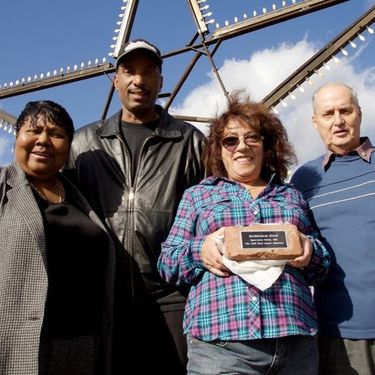
Ms Vivian Legname Barbour
Sessions auxquelles Ms Vivian Legname Barbour participe
Dimanche 5 Juin, 2016
Sessions auxquelles Ms Vivian Legname Barbour assiste
Vendredi 3 Juin, 2016
Welcome addresses and cocktail, followed by the Concordia Signature Event "The Garden of the Grey Nuns". As the opening ceremony and cocktail take place in the former Grey Nuns' Motherhouse, recycled into campus residence and reading rooms by Concordia University, delegates will also have the possibility to discover the video Three Grey Nuns (3 minutes, by Ron Rudin and Phil Lichti. Three Grey Nuns recount their memories of communal life in the Grey Nun’s Motherhouse. Built...
Samedi 4 Juin, 2016
What if we changed our views on heritage? And if heritage has already changed? While, on the global scene, states maintain their leading role in the mobilization of social and territorial histories, on the local scale, regions, neighbourhoods and parishes have changed. Citizens and communities too: they latch on to heritage to express an unprecedented range of belongings that no law seems to be able to take measures to contain, often to the discontent of...
Many people are actively using working class heritage as a resource to reflect on the past and the present, and there is a growing tendency for the heritage of working class people to be interpreted and presented to the public in museums and heritage sites—see for example the Worklab network of museums. Working class communities and organizations also play active roles in creating a memory of their own past, and mobilizing this to sustain political action in the present. Drawing on scho...
Most of what we experience as heritage emerges into conscious recognition through a complex mixture of political and ideological filters, including nationalism. In these processes, through a variety of devices (museums, scholarly research, consumer reproduction, etc.), dualistic classifications articulate a powerful hierarchy of value and significance. In particular, the tangible-intangible pair, given legitimacy by such international bodies as UNESCO, reproduces a selective ordering of cul...
Dimanche 5 Juin, 2016
"What does heritage change?" is a multifaceted question to which the answer(s) are in primary respects related to real-life negotiations among different groups of citizens, cultures, races, ethnic groups, sexual identities, and social classes about received, official and/or widely accepted or accomodated intangible attributes, cultural traditions, historic monuments, buildings, and other transmitted or revived historical legacies. Heritage designated by and for whom, for what motivations, an...
Lundi 6 Juin, 2016
The field of heritage has emerged as a key site of reflection. Influenced by shifts in the academy (e.g., post-colonial, post-structural and feminist theories), heritage scholars are bringing increased attention to the deployment of heritage as both a conceptual category and a contested field of power and discourse. Nevertheless, significant challenges remain in communicating what comprises the theoretical and methodological toolkit of heritage studies. Scholars are still mapping out the nuan...
In recent years, there has been a great deal of debate surrounding so-called ruin gazing and the politics of representing industrial or urban ruination. Recent years have seen photographers, artists, film-makers, urban explorers, scholars and others flood into newly deindustrialized areas to record signs of ruins and abandonment, prompting a public backlash against the hipster commodification of misery. Some have gone so far as to call the voyeuristic appeal of industrial or urban ruinatio...
In a collaborative and image-rich conversational presentation, “Teaching/Learning/Living Post-Industrial Ecologies” outlines the potentials and problematics of “The Right to the City,” a multi-year transdisciplinary curriculum initiative that brings graduate and undergraduate students from Concordia University to Montreal’s historic South West borough. Through our tethered teaching, four professors have asked, “what does it change for the university to teach/learn on-site with the resident...
To celebrate our film series dedicated to heritage, sponsored by the Department of American Studies at the University of Maryland and the United States Chapter of the Association of Critical Heritage Studies, this event will spotlight the iconic Sugar Shack, which is rooted from Quebec to New-England and which is both the place of maple syrup production and of friendly gatherings during the maple syrup season. In a festive atmosphere, delegates will be invited to taste one of the essential of...
Directed by William Shewbridge and Michelle Stefano USA; 35 mins Presented by Michelle Stefano ___ After 125 years of operation, the Sparrows Point Steel Mill (Baltimore, Maryland) finally closed its doors in 2012. The film, “Mill Stories”, examines the importance of the mill from the perspectives of former workers and community members while connecting their story to the larger narrative of industrial boom and bust. The film seeks to amplify the voices of forme...
Mardi 7 Juin, 2016
(Guided visits to Two Exhibitions, Centre d’histoire de Montréal- bilingual) – The Centre d’histoire de Montréal presents Dans le Griff that takes visitors into the neighbourhood of Griffintown, as depicted through the lives and memories of the Mercier family. Their life stories will take us down the streets of an industrial sector that has undergone quite the metamorphosis. Griffintown is one of the oldest industrial and working-class neighbourhoods in Montreal. In the forefro...








